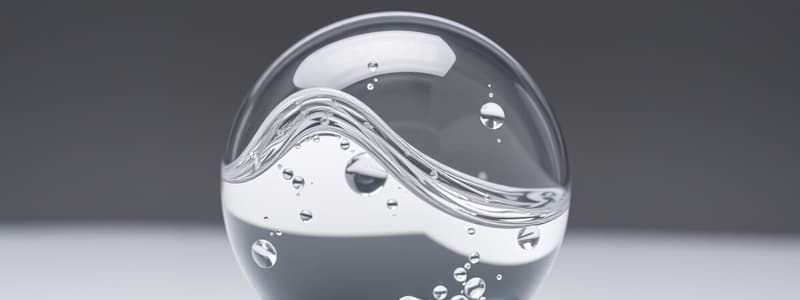Podcast
Questions and Answers
What is matter?
What is matter?
Anything that has mass and takes up space
What are the states of matter?
What are the states of matter?
Solid, liquid, and gas
What does changing states of matter refer to?
What does changing states of matter refer to?
From a solid to liquid, liquid to gas, this is a physical change, not a chemical change
Define solids.
Define solids.
Define liquids.
Define liquids.
Define gases.
Define gases.
What is the boiling point?
What is the boiling point?
What is the melting point?
What is the melting point?
Define diffusion.
Define diffusion.
What is expansion?
What is expansion?
What is compression?
What is compression?
Describe particles in a liquid.
Describe particles in a liquid.
Describe particles in a solid.
Describe particles in a solid.
Describe particles in a gas.
Describe particles in a gas.
What are the properties of solids?
What are the properties of solids?
What are the properties of liquids?
What are the properties of liquids?
What are the properties of gases?
What are the properties of gases?
Flashcards are hidden until you start studying
Study Notes
Matter
- Defined as anything that has mass and occupies space.
States of Matter
- Comprises three physical forms: solid, liquid, and gas.
Changing States of Matter
- Physical changes occur when matter transitions from solid to liquid and liquid to gas; these processes do not involve chemical changes.
Solids
- Characterized by a definite shape and volume, maintaining a fixed structure.
Liquids
- Possess a definite volume but do not hold a definite shape, adapting to the contours of their containers.
Gases
- Lack both a definite volume and shape, expanding to fill available space.
Boiling Point
- The temperature at which a liquid transforms into a gas.
Melting Point
- The temperature at which a solid turns into a liquid.
Diffusion
- Involves the movement of molecules from an area of higher concentration to an area of lower concentration.
Expansion
- Refers to the process of increasing size, volume, quantity, or scope.
Compression
- Describes a force that pushes or squeezes a material, reducing its volume.
Particles in a Liquid
- Molecules are free to move within a container while remaining in close contact with one another.
Particles in a Solid
- Molecules are tightly locked in place, allowing only limited vibration without free movement.
Particles in a Gas
- Molecules travel in straight lines until they collide with other objects, facilitating rapid movement.
Properties of Solids
- Exhibit definite shape and volume, a specific melting point, high density, incompressibility, and low rates of diffusion.
Properties of Liquids
- Feature relatively high density, relative incompressibility, ability to diffuse, and phenomena like surface tension, evaporation, boiling, and freezing; liquids flow easily.
Properties of Gases
- Display expansion, fluidity, low density, compressibility, and the ability to diffuse and effuse.
Studying That Suits You
Use AI to generate personalized quizzes and flashcards to suit your learning preferences.




